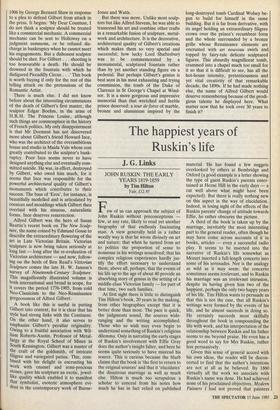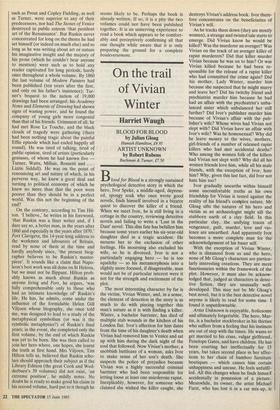The happiest years of Ruskin's life
J. G. Links
JOHN RUSKIN: THE EARLY YEARS 1819-1859 by Tim Hilton
Yale, £12.95
Few of us can approach the subject of John Ruskin without preconceptions — few, at any rate, likely to read yet another biography of that endlessly fascinating man. A view generally held in a rather woolly way is that he wrote divinely on art and nature; that when he turned from art to politics the proportion of sense to nonsense in his writings nosedived; that his complex religious experiences hardly jus- tify the effort necessary to understand them; above all, perhaps, that the events of his life up to the age of about 40 provide an absorbing story of genius in the setting of a middle-class Victorian family — for part of that time, two such families.
At first sight there is little to distinguish Tim Hilton's book, 20 years in the making, from other biographies except that it is better done than most. The pace is quick, the judgments sound, the sources wide- ranging and the writing accomplished. Those who so wish may even begin to understand something of Ruskin's religious dilemma. Only in narrating the early stages of Ruskin's involvement with Effie Gray does the author's insight falter, and here he seems quite seriously to have misread his source. This is curious because the blurb claims that the book is 'the first to return to the original sources' and that it 'elucidates' the disastrous marriage as well as much else. Hilton is much too scrupulous a scholar to conceal from his notes how much he has in fact relied on published material. He has found a few nuggets overlooked by others at Bembridge and Oxford (a good example is a letter showing the type of guest Ruskin's parents enter- tained at Herne Hill in the early days — a cut well above what might have been expected). But there is really nothing new on this aspect in the way of elucidation. Indeed, in losing sight of the effects of the Ruskin parents' change of attitude towards Effie, he rather obscures the picture.
A third of the book is taken up by the marriage, inevitably the most interesting part to the general reader, often though he may have come across accounts of it in books, articles — even a successful radio play. It seems to be inserted into the narrative of Ruskin's life somewhat as Mozart inserted a full-length concerto into some of his serenades. Nor is the analogy as wild as it may seem: the concerto sometimes seems irrelevant, and to Ruskin his marriage was an irrelevant intrusion, despite its having given him two of the happiest, perhaps the only two happy years of his life. Tim Hilton wants to persuade us that this is not the case, that all Ruskin's writings were formed by the events of his life, and he almost succeeds in doing so. He certainly succeeds most skilfully throughout the book in compounding the life with work, and his interpretation of the relationship between Ruskin and his father seems to me beyond praise. He even has a good word to say for Mrs Ruskin, rather less persuasively.
Given this sense of general accord with his own ideas, the reader will be discon- certed to find that the author's intentions are not at all as he believed. By 1860 virtually all the work we associate with Ruskin's name was done. He had achieved none of his proclaimed objectives. Modern Painters I had not proved that painters such as Prout and Copley Fielding, as well as Turner, were superior to any of their
predecessors, nor had The Stones of Venice
destroyed in public esteem 'that pestilent art of the Renaissance'. But Ruskin never concentrated for long on the theme he had set himself (or indeed on much else) and so long as he was writing about art or nature his imaginative insight and the majesty of
his prose (which he couldn't bear anyone to mention) were such as to hold any reader captivated for long periods, hardy ones throughout a whole volume. By 1860 the last volume of Modern Painters had
been published (ten years after the first, and only on his father's insistence); Tur- ner's bequest to the nation of 19,000
drawings had been arranged; his Academy Notes and Elements of Drawing had shown signs of waning power, and he found the
company of young girls more congenial than that of his friends. Grimmest of all, he had met Rose La Touche, and the black clouds of tragedy were gathering (there had been nothing tragic about the painful Effie episode which had ended happily all round). He was tired of talking, tired of public opinion, tired of artists (particularly geniuses, of whom he had known five — Turner, Watts, Millais, Rossetti and . . . Lizzie Siddall). He was on the point of renouncing art and nature of which, in his perverse way, he knew a great deal and turning to political economy of which he knew no more than that the poor were poorer than they should be in a perfect world. Was this not the beginning of the end?
On the contrary, according to Tim Hil- ton. 'I believe,' he writes in his foreword, 'that Ruskin was a finer writer and, if I dare say so, a better man, in the years after 1860 and especially in the years after 1870.' Fors Clavigera, the 14-year-long address to the workmen and labourers of Britain, read by none of them at the time and hardly anybody since, 'the present biog- rapher believes to be Ruskin's master- piece'. It sounds like a claim that Napo- leon's best work was all done on St Helena, but we must not be flippant. Hilton prob- ably knows as much about Ruskin as anyone living and Fors, he argues, 'was fully comprehensible only to those who had an intimate knowledge of' Ruskin's life. He has, he admits, come under the influence of the formidable Helen Gill Viljoen whose biography, she once told me, was designed to lead to a study of the metaphysical symbolism (or was it the symbolic metaphysics?) of Ruskin's final years; in the event, she completed only the first volume, by the end of which Ruskin was yet to be born. She was then called to join her hero where, one hopes, she learnt the truth at first hand. Mrs Viljoen, Tim Hilton tells us, believed that Ruskin scho- lars should approach their subject as if the Library Edition (the great Cook and Wed- derburn's 39 volumes) did not exist, 'an extreme position', he mildly notes. No doubt he is ready to make good his claim in his second volume, hard put to it though he
seems likely to be. Perhaps the book is already written. If so, it is a pity the two volumes could not have been published together. It is an unnerving experience to read a book which appears to be comfort- ably and perceptively confirming all that one thought while aware that it is only preparing the ground for a complete bouleversement.



















































 Previous page
Previous page